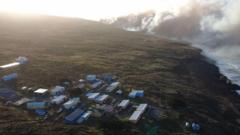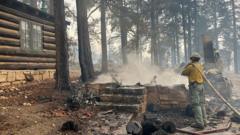The ongoing wildfires on Amsterdam Island raise significant environmental alarms and disrupt long-term research on climate change.
Devastating Wildfires Consume Half of Amsterdam Island in the Indian Ocean

Devastating Wildfires Consume Half of Amsterdam Island in the Indian Ocean
Wildfires engulf the French scientific territory, prompting evacuations and raising concerns for unique biodiversity.
The French territory of Amsterdam Island, located in the southern Indian Ocean, has been ravaged by wildfires for nearly a month, with more than 55% of its 54 square kilometers affected. The island, known for its scientific research station, does not have any permanent residents but has hosted researchers since the 1980s.
Since the flames broke out, 31 researchers have been evacuated to Réunion Island, which is situated closer to Madagascar. French authorities, recognizing the dire situation, have initiated several efforts to manage the wildfires and assess their long-term impacts on the local environment and scientific studies.
The outbreak of the fire, originally detected on January 15 by a scientist monitoring atmospheric conditions, is believed to have started near the Pointe Bénédicte observatory, a facility critical for measuring greenhouse gases and other atmospheric components. Despite the determination of the personnel present, the fire spread alarmingly towards the Martin-de-Viviès research base. Fortunately, a nearby lobster fishing vessel, the Austral, was able to conduct the evacuation just in time. Rémi Chazot, a computer scientist stationed on the island, commented on their fortune, stating they were "incredibly lucky" the vessel was still in the area, as it had been awaiting a better catch.
The wildfires have intensified due to dry weather conditions and winds reaching speeds of up to 40 km/h (24 mph). The absence of a river on the island has compounded the issue, allowing the flames to spread through a network of peat bogs. Initial satellite imagery indicates that critical infrastructure, including solar panels and communication lines, has suffered damage. Conservationists are particularly worried about the impact of the fires on the island's unique wildlife populations, which include several species of seals and albatrosses, as well as the endangered southern rockhopper penguin.
The island's isolation from pollution makes it a vital location for research on atmospheric changes and climate impact. The current situation marks the first interruption of atmospheric research on the island in 45 years. Marc Delotte, overseeing LCES's operations on the Amsterdam Islands, emphasized that this disruption would hinder long-term data acquisition that is crucial for understanding climate dynamics.
On February 7, a reconnaissance mission set sail from a French navy vessel, comprising four firefighters and seven technical staff, including a medical professional. The mission's primary objective is to secure the research settlements rather than extinguish the fires entirely. Additionally, they will investigate the fire's cause, study its rapid spread, and work to restore the island's energy and water systems, which have also fallen victim to the ongoing blaze.
Since the flames broke out, 31 researchers have been evacuated to Réunion Island, which is situated closer to Madagascar. French authorities, recognizing the dire situation, have initiated several efforts to manage the wildfires and assess their long-term impacts on the local environment and scientific studies.
The outbreak of the fire, originally detected on January 15 by a scientist monitoring atmospheric conditions, is believed to have started near the Pointe Bénédicte observatory, a facility critical for measuring greenhouse gases and other atmospheric components. Despite the determination of the personnel present, the fire spread alarmingly towards the Martin-de-Viviès research base. Fortunately, a nearby lobster fishing vessel, the Austral, was able to conduct the evacuation just in time. Rémi Chazot, a computer scientist stationed on the island, commented on their fortune, stating they were "incredibly lucky" the vessel was still in the area, as it had been awaiting a better catch.
The wildfires have intensified due to dry weather conditions and winds reaching speeds of up to 40 km/h (24 mph). The absence of a river on the island has compounded the issue, allowing the flames to spread through a network of peat bogs. Initial satellite imagery indicates that critical infrastructure, including solar panels and communication lines, has suffered damage. Conservationists are particularly worried about the impact of the fires on the island's unique wildlife populations, which include several species of seals and albatrosses, as well as the endangered southern rockhopper penguin.
The island's isolation from pollution makes it a vital location for research on atmospheric changes and climate impact. The current situation marks the first interruption of atmospheric research on the island in 45 years. Marc Delotte, overseeing LCES's operations on the Amsterdam Islands, emphasized that this disruption would hinder long-term data acquisition that is crucial for understanding climate dynamics.
On February 7, a reconnaissance mission set sail from a French navy vessel, comprising four firefighters and seven technical staff, including a medical professional. The mission's primary objective is to secure the research settlements rather than extinguish the fires entirely. Additionally, they will investigate the fire's cause, study its rapid spread, and work to restore the island's energy and water systems, which have also fallen victim to the ongoing blaze.



















